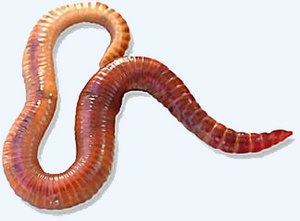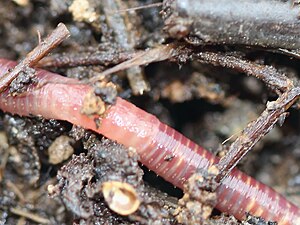It is important to note that worms collected from the garden in the wild should not be used in a worm farm or you may not achieve the results you are looking for. Various types of worms are available on the market specifically for worm farming. These worms are sold for traits that make them more desirable for composting or as live bait.
| Red Wiggler (Photo credit: Wikipedia) |
The first place to find worms for worm farming should be the local bait and tackle stores. These places typically sell a variety of worms that can be used for both composting and live bait. The Red Wiggler is known as being the best worm for composting and can usually be found in establishments such as these.
The Internet provides a mass amount of options for purchasing just about any kind of worm to use in a worm farm. Red Wigglers, Night Crawlers, Florida Wigglers, egg capsules and even exotic breeds of worms can all be found. A simple search on any search engine will produce a number of opportunities and choices.
Purchasing live animals online also means that shipping is something to take into consideration. Care has to be taken when collecting and packaging the specimens. Most worms ship well and with ease but shipping methods should be investigated. Simply ask the supplier what the rate of live arrival is and find out what their shipping methods are.
Local garden centers may also prove helpful as a supply for worms. Typically they sell other supplies for worm farming as well. Depending on the geographical location, many garden centers have a full line of the various types of worms available for purchase. The staff is available to answer questions about worm farming for new beginners. If a specific type of worm is found to be unavailable at a garden center, an order can often be placed for particular varieties.
| Close-up of Red Wiggler worm. (Photo credit: Wikipedia) |
Local worm farmers can often be found in the yellow pages under "worms" or "worm farms". This provides a great source as worm farmers are often more than willing to give tips and hints for a successful farm.
Worm farming can be fun and rewarding. Knowing where to find good quality worms is essential in maintaining a successful farm. Once your worm farm is established, it may one day prove to be yet another outlet and source of worms for those who are new to the worm farming world!



No comments:
Post a Comment